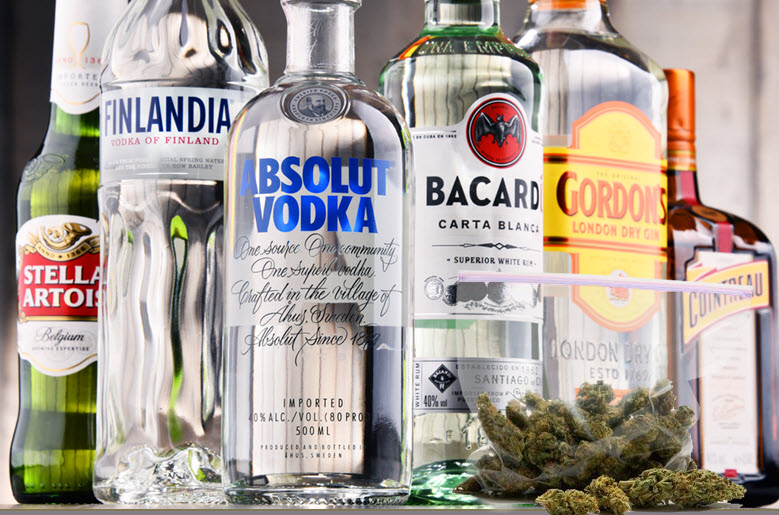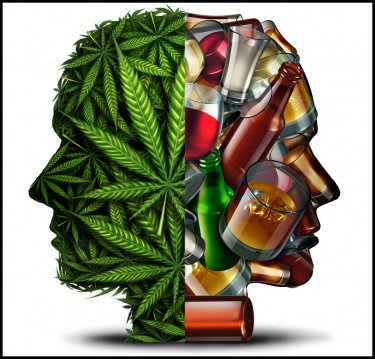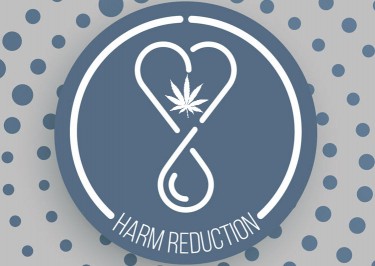Cannabis News
Liquor Stores to Start Selling Cannabis?
Published
1 year agoon
By
admin
Pennsylvania legislators have developed three distinct proposals to achieve multiple objectives: legalizing recreational cannabis, delivering social justice to individuals with minor cannabis convictions, and maximizing the economic benefits of a billion-dollar industry. Their innovative plans will cater to various needs and objectives while paving the way for a more equitable and prosperous future.
In a groundbreaking move, two co-sponsorship memos are currently making the rounds in both the House and Senate. The memos, backed by State Senator Marty Flynn of Lackawanna/Lehigh and State Representative David Delloso of Delaware, propose an ingenious idea – the sale of marijuana through state-owned liquor stores, with strict age restrictions in place to ensure it is only possessed and used by adults aged 21 and over. Furthermore, the proposals would allow Pennsylvanians to grow and process up to six marijuana plants for personal use, promoting self-sufficiency and personal responsibility.
By mandating that all marijuana sales be conducted through the state system, the commonwealth would secure a monopoly on both liquor and cannabis sales while also promoting the use of union labor. Campaign finance records reveal that both Delloso and Flynn enjoy strong support from unions, making their proposals a step towards fostering greater economic equity and workers’ rights in Pennsylvania.
State Reps. Donna Bullock, D-Philadelphia, and Dan Frankel, D-Allegheny, have crafted a new memo that takes a different approach to the issue of sales within the state liquor system. Instead, their proposal focuses on achieving five crucial objectives: safeguarding consumers, promoting social justice, advancing economic equity, preventing substance abuse, and generating revenue.
Frankel and Bullock believe it’s time to embrace a new perspective on the regulation and taxation of this significant agricultural commodity, with the ultimate goal of enhancing the health and overall welfare of the people of Pennsylvania. The common thread in all three memos strongly emphasizes promoting social justice. Although Frankel and Bullock’s memo provides fewer specific legislative details, the memos authored by Delloso and Flynn both call for the expungement of minor marijuana-related offenses.
Cannabis Legalization in Pennsylvania
Since cannabis legalization for medicinal purposes in 2018, the sales of medical marijuana in Pennsylvania have reached an astounding $6.3 billion as of November. In the 12 months leading up to October, dispensaries alone made approximately $1.4 billion in sales, according to data provided by the state Medical Marijuana Advisory Board. With 423,443 active certified patients, the demand for medical marijuana in Pennsylvania shows no signs of slowing down.
Pennsylvania’s growers and processors are subject to a 5% gross receipts tax on their sales to dispensaries. The projected gross receipts for the upcoming fiscal year are estimated at $41.8 million, as indicated by the current state budget. Patients are not required to pay sales tax on their medical marijuana purchases.
In 2018, Eugene DePasquale, the former Auditor General, conducted an analysis that estimated the size of Pennsylvania’s potential recreational marijuana industry to be worth $1.66 billion. Fast forward to budget hearings in 2021, where Matthew Knittel, director of the Pennsylvania Independent Fiscal Office, projected that legalizing recreational marijuana could generate anywhere from $500 million to $700 million in tax revenue for the state.
Although marijuana for adult use is now legal in 21 states, including Pennsylvania’s neighboring states like New Jersey, Maryland, and New York, it remains illegal under federal law. At a state Senate hearing on legalization last year, two industry experts estimated that Pennsylvania’s illicit marijuana trade amounts to a staggering $3 billion to $4 billion annually. Despite the circulation of the three memos, there has yet to be any formal legislative proposal.
The proposed bill specified that the legal age for marijuana use would be 21, outlining various production, sales, possession, and criminal record expungement regulations. Notably, the bill did not aim to alter laws about impaired driving. However, it did seek to ensure that workers are safeguarded by prohibiting their termination based on positive drug tests at non-intoxicating levels. Despite being referred to the House Liquor Control Committee, the bill ultimately remained stagnant for the session.
When the Republican Party held a majority, the prospects for legalization were quite limited. However, with Democrats now having broader support for the cause, the possibility of pro-marijuana legislation passing the House is not entirely far-fetched, although the votes are not guaranteed. Unfortunately, even if such legislation did succeed in the House, the odds of it being passed in the state Senate remain pretty slim, given the clear opposition from Republicans on this issue.
Redrafting the Medical Program.
A bipartisan effort by two state senators aims to implement significant changes that would expand the scope of those eligible for a medical marijuana card in Pennsylvania. Currently, the law only permits a limited number of doctors and patients to participate. Doctors must undergo a four-hour training course and register with the state before approving patients. Only individuals with one of the 23 approved conditions are also eligible for a medical marijuana card.
According to state Senators James Brewster (D., Allegheny) and Mike Regan (R., York), elected officials and bureaucratic staff members are not best suited to determine which ailments warrant the use of medical marijuana. As such, their proposal aims to allow any doctor authorized to prescribe controlled substances the autonomy to decide whether a patient may benefit from cannabis usage.
The proposal the two state senators put forth would eliminate the requirement for medical marijuana card renewal, which is presently mandated by the state. The yearly cost of renewing a card is $50, with specific financial hardship programs such as Medicaid being exempt from the fee, per the department’s regulations.
Conclusion
Pennsylvania’s approach to medical and recreational marijuana usage continues to evolve, with proposed legislative changes aimed at expanding eligibility for medical marijuana use and legalizing recreational use.
While progress has been made, such as the legalization of medical marijuana sales in 2018, the issue remains politically divisive, with opposition from Republican lawmakers and concern over the impact of legalization on public health and safety.
Despite this, there is increasing support for changes to the existing laws, with experts predicting significant economic gains if recreational use is legalized. As the debate over marijuana legalization continues in Pennsylvania, it remains to be seen what the future holds for the state’s approach to cannabis regulation.
LIQUOR STORES AND WEED, READ ON…
IS CANNABIS MORE POPULAR THAN BOOZE AFTER COVID?
You may like
Cannabis News
California Awards $12 Million In Local Cannabis Equity Grants To Repair Drug War Harms
Published
10 hours agoon
May 7, 2024By
admin
California’s path to cannabis social equity: from arrests to advocacy
Data from the California Department of Justice reveals that nearly half a million individuals were arrested on cannabis charges in the state between 2006 and 2015. Even after Governor Schwarzenegger authorized a statewide decriminalization program in 2010, thousands continued to face serious misdemeanor charges related to cannabis. Despite California’s pioneering legalization of cannabis through Proposition 215 in 1996, just two years after the 1994 Crime Bill, the state legislature’s approach to cannabis legal reform was not as progressive as one might expect. The impact of the War on Drugs during this period was profound, with marijuana possession arrest rates increasing by 124% in 2010, even as rates for other serious crimes decreased significantly.
Proposition 64, passed a few years later, lacked any discussion addressing the damage caused by past policies. However, with social equity becoming a prominent topic in the cannabis industry, California officials have started investing significantly in social equity policies. Initiatives like the California Cannabis Equity Act of 2018 and the Budget Act of 2019 reflected this shift, aiming to support the economic development of communities and individuals adversely affected by previous harsh cannabis policies in what is now a multi-billion dollar industry.
Investing in justice: California’s cannabis social equity journey
In November 2023, California officials finally announced the application process for aspiring social equity business owners via the Cannabis Equity Grants Program for Local Jurisdictions which itself is an extension of Governor’s Office of Business and Economic Development. As the substantial costs of running a fully legal cannabis business in California can often get obscenely expensive, these large grants are meant to fund and lessen the financial burden of these exorbitant costs.
The overall purpose of this multi-million dollar initiative is “to advance economic justice for populations and communities impacted by cannabis prohibition and the War on Drugs by providing support to local jurisdictions as they promote equity in California and eliminate barriers to enter the newly regulated cannabis industry for equity program applicants and licensees,” according to the website. In February of 2023, the Governor’s Office of Business and Economic Development distributed approximately $15 million in social equity-focused funding to 16 different cities and counties throughout the Golden State.
Breaking barriers: California’s social equity initiatives in cannabis
At the end of last month, California officials finally awarded those patiently awaited funds. Funded by a $12 million portion of the billions in tax revenue raised by California cannabis sales, the grants will go to a total of 10 different cities and counties. While most awarded counties reside in Northern California, the city of Coachella also received $350,000 in funding. In particular, Oakland received $3 million and the city and county of San Francisco received over $2 million. “California’s cannabis industry is not just about business; it’s about righting past wrongs. Through initiatives like the Cannabis Equity Grants Program, the state is investing in communities once harmed by harsh drug policies, creating opportunities and economic justice for those affected,” said California Cannabis Attorney Karen Albence.
From prohibition to inclusion: California’s cannabis equity evolution
The possibilities with this funding are nearly endless. Funds will go towards local programs offering technical support, regulatory compliance and assistance. One notable grantee includes San Jose’s Cannabis Equity Business Academy. Social equity advocates have even more progress to celebrate, as the Governor’s Office of Business and Economic Development and Governor Gavin Newsom’s new budget proposal would invest $15 million further in similar programs by October of 2024.
Although it has taken a while for these programs to be created and even longer to be implemented, we are hopeful for this new era. This $12 million in local, social equity grants is a drop in the bucket, considering the damage that was done. But a drop is better than an empty bucket. With substantial investments and ongoing support, California is starting to pave the way for a more equitable and inclusive cannabis industry– one where all individuals, regardless of background, have the chance to participate and succeed. As the state continues to allocate resources and expand such programs, the future holds promise for further progress in achieving social equity within the California cannabis landscape.
Cannabis News
Patient Zero for Untreatable Depression Begins Groundbreaking Psychedelics Therapy
Published
11 hours agoon
May 7, 2024By
admin

In a phase 2b clinical trial, Beckley Psytech has started treating the first subject for BPL-003, an intranasal synthetic formulation of the psychedelic chemical 5-MeO-DMT intended for patients with treatment-resistant depression.
With FDA clearance for investigational new medication status in February, this groundbreaking research represents the biggest controlled examination into the potential of 5-MeO-DMT, involving 40 locations throughout Australia, Europe, and the US.
The trial, employing a randomized, quadruple-masked design, seeks to identify optimal dosages of BPL-003, complemented by psychological support, in 225 individuals grappling with moderate to severe treatment-resistant depression, compared to a placebo group.
Efficacy will be gauged using the Montgomery-Asberg Depression Rating Scale at various intervals throughout the trial, with all participants receiving psychological support before, during, and after dosing. An open-label extension is slated for select sites eight weeks post-initial dosing to evaluate sustained effects following a second dose.
Anticipated findings from this phase 2b endeavor, projected by late 2024, will augment insights gleaned from the ongoing phase 2a exploration of BPL-003, as highlighted by the company.
Cosmo Feilding Mellen, CEO of Beckley Psytech, expressed confidence in the compound, citing promising safety and pharmacokinetic data. He emphasized its capacity to induce brief yet profound subjective experiences correlating with therapeutic benefits, underscoring the company’s eagerness to advance BPL-003 through the clinical development pipeline.
Unprecedented Research Scope
An important turning point in the field of psychedelic research, especially in the area of mental health therapy, was reached with the start of Beckley Psytech’s phase 2b clinical experiment. The large-scale nature of this experiment highlights an important development in our knowledge of the therapeutic potential of psychedelic substances, with a particular emphasis on 5-MeO-DMT for patients suffering from depression that does not respond to conventional therapy. This experiment, which spans 40 sites throughout Australia, Europe, and the US, is the biggest controlled investigation into the possible effectiveness of 5-MeO-DMT, in contrast to earlier research. This wide outreach guarantees a varied pool of participants and improves the trial’s outcomes dependability and generalizability.
A rising awareness among scientists of the need for novel strategies to tackle the widespread problems associated with treatment-resistant depression is reflected in the decision to launch such an extensive research project. Researchers want to increase the number of therapy choices available for those who have not reacted well to traditional medications by investigating the therapeutic benefits of 5-MeO-DMT in a rigorous clinical environment. The trial’s multi-site design also makes it easier for clinicians and researchers in various areas to collaborate, which promotes a group effort to further our understanding of psychedelic-assisted treatment.
The size of this phase 2b experiment not only emphasizes the significance of its findings, but also demonstrates Beckley Psytech’s dedication to pushing the limits of psychedelic research. Through strategic alliances and diligent preparation, the firm has proved its commitment to performing high-quality clinical studies that meet rigorous scientific criteria while investigating novel treatment approaches. This innovative method not only aids the area of mental health treatment, but also helps to de-stigmatize psychedelics by demonstrating their ability to treat significant psychiatric illnesses safely and responsibly.
The experiment is expected to yield valuable insights that might influence future research, clinical recommendations, and regulatory choices related to the use of psychedelic substances in mental health therapy. This is because the trial is expected to proceed and data will accrue. Psychedelic-assisted therapy is being promoted as a possible therapeutic option for the intricate problems associated with treatment-resistant depression, thanks to the combined efforts of researchers, physicians, and study participants.
Trial Design and Objectives
BPL-003’s phase 2b clinical trial has been carefully designed to assess the drug’s potential as a therapy for people with depression who are not responding to conventional treatments. The experiment uses a quadruple-masked, randomized design to reduce biases and guarantee the validity and dependability of the results. This methodological rigor bolsters the foundation for well-informed decision-making on developing BPL-003 and increases the legitimacy of the study’s findings.
Central to the trial’s objectives is the identification of optimal dosages of BPL-003 that can effectively alleviate symptoms of moderate to severe treatment-resistant depression. By employing a range of doses and comparing them against a placebo group, researchers seek to discern the therapeutic window within which BPL-003 demonstrates the greatest efficacy while minimizing adverse effects. This dose-finding aspect of the trial is crucial for informing subsequent clinical studies and eventual therapeutic use.
The experiment incorporates psychological support as an additional therapeutic component in addition to dose optimization. All patients get thorough psychological care before, during, and following medication since it is acknowledged that depression is a complex condition with psychosocial components that may influence treatment outcomes. To promote complete healing and recovery, this holistic approach emphasizes the need to address not only the biology but also the psychological and emotional elements of depression.
Furthermore, the trial’s design includes strong metrics for measuring effectiveness, particularly using the Montgomery-Asberg Depression Rating Scale at several points throughout the research. This validated method enables researchers to systematically assess changes in depression symptoms and track the therapeutic benefits of BPL-003 over time. The trial uses standardized evaluation techniques to improve the consistency and comparability of outcomes across multiple research sites, increasing the reliability and generalizability of the findings.
Evaluation Methods and Milestones
A wide range of evaluation techniques and milestones are included in the phase 2b clinical study to assess BPL-003’s effectiveness in treating depression that is resistant to therapy. The Montgomery-Asberg Depression Rating Scale, a reliable instrument for gauging depression symptoms and treatment response, is a key component of this evaluation. Researchers can systematically monitor changes in participants’ depressed symptoms and evaluate the therapeutic efficacy of BPL-003 in comparison to placebo by giving this scale to participants at different intervals during the experiment.
The study underlines the need to provide psychological support to all participants before, during, and after dosing. This integrated approach stresses the need to meet the holistic needs of patients receiving therapy while also recognizing the complex interplay between biological, psychological, and social factors in depression. The study’s purpose is to improve treatment outcomes and participants’ overall well-being by offering comprehensive psychological support, such as counseling and therapeutic sessions, during the experiment.
Furthermore, the trial includes an open-label extension phase at select sites, scheduled eight weeks post-initial dosing, to evaluate the sustained effects of BPL-003 following a second dose. This extension phase allows researchers to assess the durability of treatment response and investigate the potential for long-term therapeutic benefits. By extending the observation period beyond the initial dosing phase, the trial aims to provide insights into the maintenance of treatment effects over time and inform recommendations for the optimal dosing regimen of BPL-003 in clinical practice.
Bottom Line
Beckley Psytech’s phase 2b clinical trial of BPL-003 for treatment-resistant depression marks a significant milestone in psychedelic research. With its expansive scope, rigorous trial design, and emphasis on comprehensive evaluation methods, the study holds promise for advancing our understanding of psychedelic-assisted therapy. As the trial progresses and data accumulates, it is poised to provide valuable insights that could influence future treatment approaches and regulatory decisions in the field of mental health.
MUSHROOMS TO END DEPRESSION, READ ON…
Cannabis News
A Deep Dive into the Benefits of Medical Marijuana for Mental Health
Published
1 day agoon
May 6, 2024By
admin

New Study Dives Deep Into The Benefits Of Medical Marijuana For Patients’ Mental Health
Cannabis Is A Healing Tool In More Ways Than One
As of today, 38 states plus the District of Columbia and three territories have legalized marijuana for medical purposes.
There’s a reason why the movement to legalize weed for therapeutic use only continues to grow: that’s because it simply works. Depending on the state, the most common conditions that cannabis has accepted medical uses for includes seizures, nausea, chronic pain, glaucoma, cancer, multiple sclerosis, muscle spasms, and others to name a few. But even without a medical marijuana card, thousands of people are already enjoying the powerful therapeutic properties that cannabis has for a number of ailments.
That said, using cannabis for a physical ailment also has other positive effects – particularly on patients’ mental health.
There is a strong link, after all, between chronic illnesses and poor mental health. The diagnosis of a physical disease will directly impact and challenge your emotions or state of mind, which is why it’s so common to suffer from severe depression, anxiety, and bouts of anger or sadness. It’s only natural: it seems like you’re going into a downward spiral of emotions, having to figure out treatment, prognosis, and how to live the rest of your life.
But medicating with cannabis may not only help your physical ailment; it can greatly help you regain sanity, too.
According to a recent study out of Cambridge in the United Kingdom conducted by researchers from Switzerland’s University of Basel, patients with chronic health problems most especially chronic pain experience significant improvements in their mental health after medical marijuana has been legalized. The researchers assessed feedback from 7.9 million participants of an online survey conducted from 1993 through 2018.
The participants were grouped into various categories based on their cannabis consumption, including individuals who were “highly likely to abstain from using marijuana, to use marijuana as a recreational drug, or to use it for medical reasons” to identify the impact of medical marijuana legalization on mental health. The investigators also considered the use of marijuana for chronic pain. They measured the participants’ mental health by polling participants to grade their state based on the number of days they experienced mental health issues.
The findings, which were published in Health Economics, Policy, and Law, revealed: “Eased access to marijuana through medical marijuana laws reduce the reported number of days with poor mental health for individuals who consume marijuana for medical purposes and for those individuals who likely suffer from frequent pain.”
They also found that medical marijuana legalization didn’t impact the youth and recreational consumers. “Overall, our results show that medical cannabis legalization in the USA benefits the people it is intended for without harming other groups,” according to Professor Alois Stutzer. He also summarized that there a clear association between mental wellness and liberalization.
The findings of a similar study was released in 2023; it was conducted by researchers at the University of Sydney. They polled over 2,300 patients who were prescribed cannabis in the form of CBD and THC in a carrier oil from November 2020 through December 2021. The participants’ ages ranged from 18 to 97, and almost 2/3 of them were female.
The participants were asked to measure their quality of life relating to their overall health, pain, sleep, depression and anxiety before they began therapy with marijuana. They were polled again after 2 weeks of therapy, a routine that continued monthly for 3 months.
“Within the first three months of medicinal cannabis therapy, participants reported improvements in their health-related quality of life, fatigue, and health conditions associated with anxiety, depression, and pain,” explained Margaret-Ann Tait, a senior research officer to SWNS.
Additionally, the researchers reported that the patients experienced significant benefits when it came to their fatigue, pain, and quality of life.
The struggles with mental health are even more intense for cancer patients. However, medical marijuana use has been shown to help reduce depression, anxiety, and fatigue in patients diagnosed with cancer. A single-center, case-matched study conducted on 74 patients who were recently diagnosed with head and neck cancers found that cannabis users, compared to non users, reported less pain, better well-being, less fatigue, depression, and anxiety.
Head and neck cancers, in particular, can significantly impact one’s mental health given that it affects one’s swallowing mechanisms, facial structures, and speech. “These very much impact people’s social interactions and sense of self-worth,” said Dr. Zhang.
Conclusion
Medical marijuana has numerous therapeutic applications for patients suffering from a wide array of disease. Its anti-inflammatory, anti-emetic, anxiolytic, and anti-epileptic effects have been studied, and found to be extremely beneficial for those who are healing from disease. Cannabis makes life more bearable while helping to treat pain at its source, which is a major help for patients who simply want to make it, day by day.
At this day and age, we unfortunately still don’t have the standardized formulations of THC or CBD to help with conditions. However, doctors who are knowledgeable with medical marijuana can help. If you or a loved one are struggling with chronic disease and want to explore using marijuana as adjunct treatment, reach out to a medical professional who can help. There is hope on the other end of the line when cannabis is involved!
CANNABIS MENTAL HEALTH TIPS, READ ON…

Does Lizzo Consume Weed – The Fresh Toast

Do Delta 8 Edibles Work For Female Arousal?

Could You Help Your Lips With CBD Balm

California Awards $12 Million In Local Cannabis Equity Grants To Repair Drug War Harms

Patient Zero for Untreatable Depression Begins Groundbreaking Psychedelics Therapy

Mother’s Day weed gift guide 2024

Key Things To Know About Hemp And Marijuana Drinks

Indica, Sativa, Hybrid & More

A Deep Dive into the Benefits of Medical Marijuana for Mental Health

Canada’s medical cannabis exports jump to CA$220 million as domestic sales fall

Distressed Cannabis Business Takeaways – Canna Law Blog™

United States: Alex Malyshev And Melinda Fellner Discuss The Intersection Of Tax And Cannabis In New Video Series – Part VI: Licensing (Video)

Drug Testing for Marijuana – The Joint Blog

What you Need to Know

Cannabis, alcohol firm SNDL loses CA$372.4 million in 2022

NCIA Write About Their Equity Scholarship Program

City Of Oakland Issues RFP For Employee Training Programs

It has been a wild news week – here’s how CBD and weed can help you relax

A new April 20 cannabis contest includes a $40,000 purse

UArizona launches online cannabis compliance online course
Trending
-

 Cannabis News1 year ago
Cannabis News1 year agoDistressed Cannabis Business Takeaways – Canna Law Blog™
-

 One-Hit Wonders1 year ago
One-Hit Wonders1 year agoUnited States: Alex Malyshev And Melinda Fellner Discuss The Intersection Of Tax And Cannabis In New Video Series – Part VI: Licensing (Video)
-

 drug testing5 months ago
drug testing5 months agoDrug Testing for Marijuana – The Joint Blog
-

 Cannabis 1011 year ago
Cannabis 1011 year agoWhat you Need to Know
-

 Marijuana Business Daily1 year ago
Marijuana Business Daily1 year agoCannabis, alcohol firm SNDL loses CA$372.4 million in 2022
-

 Education1 year ago
Education1 year agoNCIA Write About Their Equity Scholarship Program
-

 Education1 year ago
Education1 year agoCity Of Oakland Issues RFP For Employee Training Programs
-

 Cannabis1 year ago
Cannabis1 year agoIt has been a wild news week – here’s how CBD and weed can help you relax






